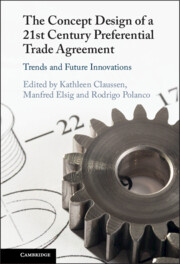The Concept Design of a Twenty-First Century Preferential Trade Agreement
The Concept Design of a Twenty-First Century Preferential Trade Agreement describes the current status and possible future evolution of trade agreements. The individual contributions provide fine-grained analyses of the various challenges trade agreements face and how these differ across countries. The book brings together leading researchers from international law and international relations to provide conceptual and empirical insights to inform the ongoing reform debates. By taking stock of scholarly advances, the book further aims at stimulating cross-fertilisation in the study of trade agreements in the field of international economic law. This title is also available as Open Access on Cambridge Core.
Kathleen Claussen is Professor of Law at Georgetown University, Washington, DC. She is the author of more than forty articles and essays concerning trade, investment, and international dispute settlement, among other related research areas. She has also served as counsel or arbitrator in over two dozen international disputes. Among other leadership roles, she has served on the Executive Council and Executive Committee of the American Society of International Law and is Co-Editor-in-Chief of the Journal of International Economic Law.
Manfred Elsig is Full Professor of International Relations at the World Trade Institute, University of Bern. His research focuses on international political economy, international organisations, international courts, preferential trade agreements, and European trade policy. He is the Co-Editor of Governing the WTO: Past, Present and Beyond Doha (Cambridge University Press, 2011), Assessing the World Trade Organization: Fit for Purpose? (Cambridge University Press, 2017), and The Shifting Landscape of Global Trade Governance (Cambridge University Press, 2019).
Rodrigo Polanco is a senior researcher, lecturer, and academic coordinator at the World Trade Institute, University of Bern, a legal adviser at the Swiss Institute of Comparative Law, and a visiting professor at the University of Chile. He holds a Bachelor and a Master of Laws (University of Chile), an LLM in International Legal Studies (New York University), and a PhD in Law (University of Bern). He has published extensively as an author and editor in leading international academic publications and journals on investment, trade, tax, and environmental law.

